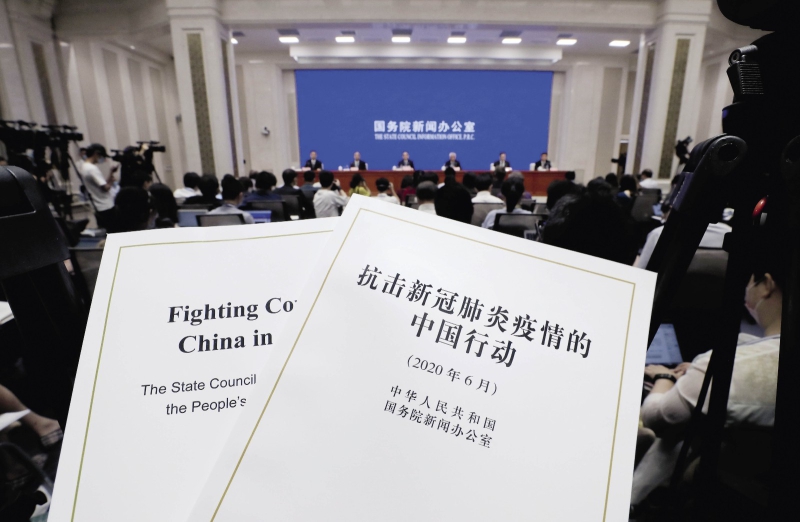Improving Global Information System for Pandemic Response

The hard truth laid bare in this pandemic tells people that humanity needs to form an effective, cooperative, and transparent system for global public health governance.
China’S State Council Information Office released a white paper titled “Fighting COVID-19: China in Action” in early June. The white paper chronicles China’s all-hands-on-deck response to the public health emergency, showing what makes a responsible major country in the face of a crisis. The country deserves credit for its efficiency in messaging the epidemic dynamics to its people as well as its timeliness and transparency in terms of information sharing with the international community because what it has done greatly helped both the domestic and global fights against the virus.
The hard truth laid bare in this pandemic tells people that humanity needs to form an effective, cooperative, and transparent system for global public health governance. Countries should strengthen cooperation in building a community with a shared future for humankind and optimize the system for epidemic information sharing to safeguard the lives of the planet’s human population.

Building consensus and trust
Virus respects no national borders. No country will be spared if an epidemic strikes, nor will any country win the fight alone.
As Chinese President Xi Jinping said when addressing the opening ceremony of the Boao Forum for Asia Annual Conference in 2015, “No country can have its own security ensured without the security of other countries or of the wider world.” The future and destiny of different countries and nations are closely connected and inter-dependent. In face of a global emergency, the most important imperative is to reach consensus for concerted response efforts. If countries across the world fail to build such a consensus, act on the principle of mutual trust or share epidemic information, the response will be chaotic and blind.
When meeting with visiting World Health Organization (WHO) Director-General Tedros Adhanom Ghebreyesus on January 28, Xi said that the Chinese government has been releasing information about the epidemic in a timely, open, transparent, and responsible manner, responding to the concerns of all sides actively, and enhancing cooperation with the international community.
China has also been sharing its effective measures in responding to the epidemic with other countries and international organizations. Since late January, Chinese President Xi Jinping has spoken with foreign state leaders and heads of international organizations on more than 50 occasions, practicing the principles of building a community with a shared future for humankind.
“Major infectious disease is the enemy of all,” Xi said when speaking at the Extraordinary G20 Leaders’ Summit video conference on March 26. “At such a moment, it is imperative for the international community to strengthen confidence, act with unity and work together in a collective response. We must comprehensively step up international cooperation and foster greater synergy, so that humanity, as one, could win the battle against such a major infectious disease,” Xi stressed.
Countries should discard parochial nationalism, and oppose attempts to politicize the COVID-19 pandemic, undermine global consensus on a joint pandemic response, or sabotage mutual trust.
Cooperation: the only way out
Facts speak louder than words. It is a proven fact that no country is able to stem the spread of a pandemic alone, thus making global cooperation the only solution.
China has been on the track of such cooperation from the very beginning. On January 21, the State Council Joint Task Force for the Novel Coronavirus Epidemic Response was established to coordinate national efforts to fight the virus, and regularly hold press conferences on the outbreak. On the same day, the National Health Commission began to release infection figures to the public on a daily basis. The English version of the daily report has been available since February 3.
In the meantime, China has unreservedly shared with the WHO, regional organizations, and various countries its experience in epidemic response and medical treatment as the pandemic situation evolves. It has also been conducting global cooperation in drug and vaccine development and offering assistance to other countries fighting the pandemic. Apart from face masks, protective gowns, testing kits, ventilators, and other medical supplies, China sent medical teams to countries including Iran, Iraq, Italy, Serbia, Cambodia, Pakistan, Venezuela, and Laos.
What China has done in the face of the health emergency was applauded internationally.
“The speed with which China detected the outbreak, isolated the virus, sequenced the genome and shared it with the WHO and the world is very impressive, and beyond words,” said WHO Director-General Tedros.
Dino Patti Djalal, founder of the Foreign Policy Community of Indonesia and former deputy foreign minister of Indonesia, lauded China’s actions in assisting other countries battle the virus, while containing its domestic outbreak and gradually reopening the economy.
According to Ravindra Gupta, professor of clinical microbiology at the Cambridge Institute for Therapeutic Immunology and Infectious Diseases, the Chinese government and related institutes shared information about the virus in an open manner, so that global researchers could understand the biological characteristics and genetic sequence of the virus and curb the spread through concerted efforts.
Unleashing the power of synergy
The community with a shared future for humankind has the power to combat the virus.
To better play the role of such a community, countries across the world should step up cooperation in the following aspects.
First, reporting systems for major epidemic outbreaks should be established particularly in sectors where mass gatherings are unavoidable. Transparency for such information should be improved.
Second, countries around the globe should establish and improve a long-lasting mechanism for information sharing as data support to effective global policies for public health.
Third, they should be fully aware of the unique nature of the ongoing COVID-19 pandemic and mull over policies to make its containment routine work. In a global concerted response to the pandemic on a regular basis, an open and transparent information system should be put in place for effective results.
Fourth, they should actively defend the role of the United Nations and support epidemic response efforts by international organizations including the WHO, the United Nations Children’s Fund, the United Nations World Food Program, the Food and Agriculture Organization of the United Nations and the International Telecommunication Union.
Zhang Jingwen is an associate professor on public communication studies with the Northwestern Polytechnic University.
 Facebook
Facebook
 Twitter
Twitter
 Linkedin
Linkedin
 Google +
Google +










